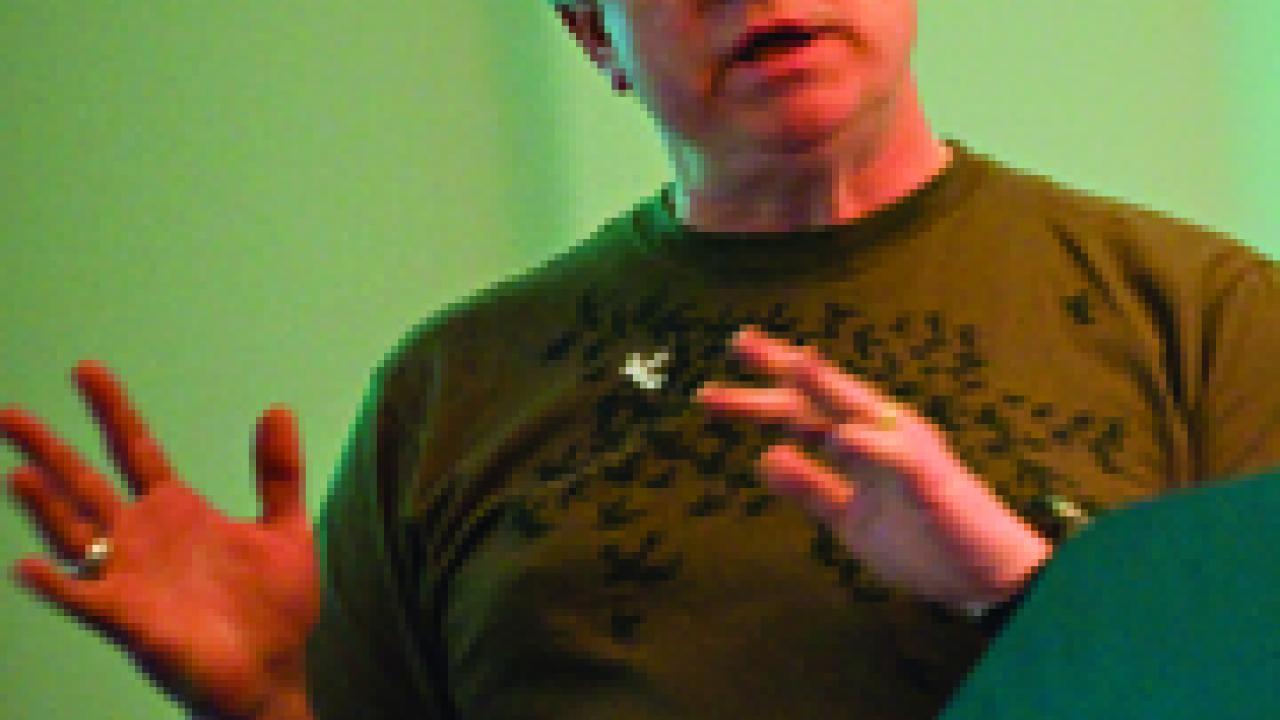Rick Prelinger’s biggest thrill is “mainstreaming" historical documents for public consumption.
But getting history into the hands of the average citizen is no easy task, the archivist says.
Overbearing copyright issues and rampant commercialism, he argues, threaten the free exchange of information on which a knowledge society — especially its libraries — depends.
“My core concern is that if we don’t find ways to push our holdings out to the public, then we face an uncertain future,” said Prelinger, founder of the Prelinger Library in San Francisco, who spoke on campus April 8. His talk, “Reinventing the library,” examined what it means to be a public-spirited archivist in a fast-changing Internet world.
“Wonderful and unpredictable things happen when ordinary people get access to primary documents,” he said.
Mary Page, assistant university librarian for technical services at UC Davis, said Prelinger offered “a lot of ideas and stimulation” to the audience of about 25 faculty, staff and students.
“We’ve been pretty conservative (as a field) in pushing our holdings out to the public,” said Page, noting that scarce financial resources hinder libraries.
Decades ago Prelinger began collecting what he referred to as “ephemeral” film — educational, industrial, training, high school driver’s ed films, a film of the conversion of a Chrysler factory from making cars to making tanks in World War II — all the filmmaking that’s other than Hollywood. To him, it seemed like a treasure trove of American life and culture.
Prelinger’s efforts grew into the Prelinger Library, a private research library in San Francisco that is open to the public. Its collections encompass some 50,000 books, periodical volumes and ephemera.
It gives Prelinger deep emotional satisfaction to run the operation.
“We live to be consumed,” Prelinger said, “and we flourish when we’re used.”
His library strives to “remake what a library might be,” both physically and in cyberspace. At last count, more than 30 million downloads have been made of Prelinger library holdings, he said.
‘Authentic expressions’
Today, the Internet has changed everything, and libraries and public archives face online competition from the likes of Google, Flickr, YouTube and Wikipedia.
“Almost anyone of us can now make mass media,” said Prelinger.
He believes that people crave “authentic expressions over corporate” marketing material. Toward this, he designed his library as an ultra-open experience for users — one never knows what moments of “serendipity” they may indulge in while browsing the stacks, physically or online.
Rather than concern themselves with rigid lending policies or copyright protections, library systems should focus on “more product, less process” to better serve patrons, Prelinger said.
“Think about what we do on every level, and how we interact with the user. All libraries can be workshops.”
He believes that a civilized society needs good libraries to understand its history.
“Every community needs to come to terms with its past,” Prelinger said.
However, the risk today is that all “these traces of history fall into private hands,” and we lose our collective historical memory, Prelinger said.
This “enclosure” of knowledge, as he describes it, is the gravest threat facing archivists, historians and librarians. Those who control knowledge and history have the power to shape the future.
To thwart this, ordinary people themselves have the ability to become de facto archivists, Prelinger said. Many of the best specialized archives around are created by independent, non-academic scholars, he noted.
“Archives are like an experimental farm, a place for contemplation,” Prelinger said.
His field, he says, can better promote itself. “We need to nurture a fan base.”
But Prelinger disputes the notion that young people are bored with reading or libraries. “The toughest people to get out of our library are the teenagers.” As he puts it, “Reading is a gateway behavior that leads to all types of thinking.”
However, much is at stake today, Prelinger said. He worries that the consumer has been left out of the recent Google Book Search settlement, which allows Google to fund a new book rights registry that gives power to the company to digitize books and sell downloads.
“If the Google book deal is approved without any changes, we could soon lose 100 million books that society doesn’t know what to do with,” said Prelinger, referring to “orphan works,” or works under copyright, but whose owner is not known.
The Google agreement is currently under review in a U.S. District Court. On his Web site, Prelinger writes that U.S. government documents are, by law, in the public domain, as they are produced with taxpayer funds.
However, he noted, Google is treating government documents published after 1923 in the same way they are treating non-government material — as potentially copyrighted material.
“This is unnecessarily cautious, and what it means is that only ‘snippets’ are available and the document remains unreadable,” he wrote.
Prelinger argued that the “implicit social contract between archives and users is defined by access.”
Access to knowledge is also provided by newspapers — as for this industry’s slowdown, Prelinger calls it a painful time of transition.
“We’re still going to get news and information, but there’s a natural evolution going on here.”
He added, “newspapers will reinvent themselves — they’re amazing brand vehicles. And, good writers will always have places to write.”
At the same time, Prelinger says the money flow in fields like publishing is problematic.
“The entity that threatens the writer or the artist is not the user or reader (violating copyright issues) but the middleman with a business model,” he said.
On the other hand, archives are empowering, Prelinger said. “Let’s open up the past. Interesting things happen when we do so.”
PUBLIC HISTORY
Rick Prelinger’s talk was the first of four planned for the Spring 2009 Public History Speakers Series. Sponsored by the American Studies Program and the Program in Technocultual Studies, the series will explore how knowledge is preserved, shaped and used. For upcoming talks, visit dhi.ucdavis.edu/?p=1222.
For the Prelinger Library, go to www.home.earthlink.net/~alysons/library.html.
Media Resources
Clifton B. Parker, Dateline, (530) 752-1932, cparker@ucdavis.edu
